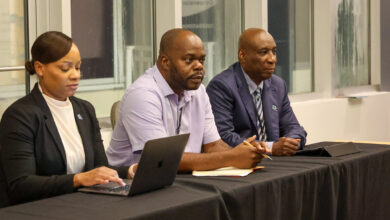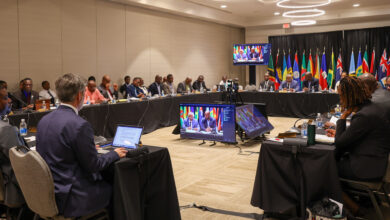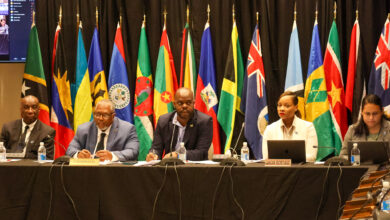CARICOM Secretariat, Turkeyen, Greater Georgetown, Guyana) The Twenty-Fifth Meeting of the Council for Trade and Economic Development (COTED) opened at the Buddy’s International Hotelin Georgetown Friday with challenges thrown out for the Region to become more competitive in order to respond to the challenges of the current global environment.
In brief addresses at the opening, Secretary-General of the Caribbean Community (CARICOM) H.E. Edwin Carrington and COTED Incoming Chairman, The Hon. Karl Samuda, Minister of Trade and Industry of Jamaica both referred to the rapidly changing international trading arena and pointed to steps the Region must take towards an effective response.
The Secretary-General made specific reference to the recently-concluded Economic Partnership Agreement (EPA) between the Caribbean Forum of African, Caribbean and Pacific States (CARIFORUM) and the European Union (EU) which he said heralded the end of the non-reciprocal preferential trade relationship the Region enjoyed with Europe since 1975.
Mr Carrington said that the Secretariat, acting in keeping with a mandate from the Council, proposed to convene a Special Meeting of the COTED on External Trade Negotiations in Guyana on 28-29 February to receive the recommendations of a Reflections Group which would be reviewing the EPA negotiations.
“This Council has called for reflection on the process of preparation and approach to future external trade negotiations in order to inform the Region’s strategy for the anticipated bilateral trade negotiations now under consideration. To that end, the COTED took the decision that an independent review be undertaken of the EPA negotiations and the outcome be considered by a Reflections Group comprising Senior Officials of Member States, the CARICOM and OECS Secretariats, the Caribbean Regional Negotiating Machinery and stakeholders from across the Community,” the Secretary-General said.
Mr Carrington pointed out that bilateral trade and economic arrangements also had significant implications for the development of the economies of individual Member States, but also the development of the CARICOM Single Market and economy (CSME).
“One obvious implication is the absolute imperative to greatly enhance the competitiveness of our economies. To this end, we need, inter alia, to accelerate the process of operationalising the CARICOM Development Fund, including the Regional Development Agency. Of immediate necessity in this regard, is the need for Member States to meet their obligations to the Fund,” the Secretary-General said. He urged Member States to also meet their obligations to the recently-launched CARICOM Competition Commission.
Minister Samuda also referred to the erosion of the Region’s “comfort level” provided by preferential arrangements and called on the Community to view current global environment as a catalyst to fast-track the integration process.
“Our Region is now at a critical juncture in defining our position in the global economic arena. The world is changing rapidly. Gone is the comfort level provided by preferential arrangements which guaranteed established markets for our commodities. We now have to make our way in an increasingly hostile and competitive world which is conditioned by relentless change. The prosperity of our peoples will therefore be determined by our capacity to embrace and respond to change,” Minister Samuda added.
`External Trade and Economic Relations’ is a key agenda item of the COTED Meeting, as is `Poverty and the Rising Cost of Living’ and `Information and Communications Technology (ICT) as a `Catalyst for Development’.
According to Minister Samuda, the Community’s response to poverty and the rising cost of living called for a balance between protecting the peoples of the Region from the negative effects of the high cost of living while ensuring the viability of Regional industries.
With regard to ICT, Minister Samuda noted that ICT is driving current global economic activities and in integral to the Region’s existence.
“We must invest in ICT in our drive to increase labour productivity in the Region’s public and private sectors. We must treat innovation as a prerequisite to becoming competitive in the global marketplace,” he said.





